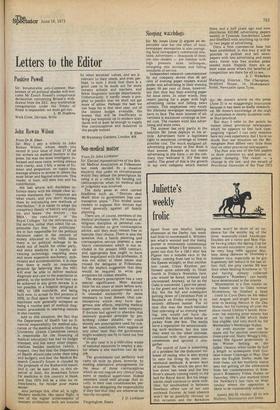John Rowan Wilson
From Dr R. Eban
Sir: May I pay a tribute to John Rowan Wilson, whose death you record in your issue of June 2? Of all the writers on medical matters in the press, his was the most intelligent, in formed and sane voice, writing always with clarity, and, 1 felt, a sense of humour and proportion, on topics that manage always to arouse in others the most bitter and bigoted emotions. This reader, at least, will miss him and his contribution.
His last article will doubtless infuriate many with his simple clear accurate statement that "resources are what count, and you don't increase them by introducing new methods of distribution." It is easier to adopt the conspiracy theory of history and politics, and blame 'the doctors ', ' the BMA', 'the consaltants ', or 'the Royal Colleges ' for the deficiencies in the service, rather than admit the unpalatable fact that 'the politicians' are in fact responsible for the political decisions taken in the amount of money allocated to the NHS. Since there is no political mileage to be made out of health for either party, and since medicine is a rapidly advancing technology, requiring more and more expensive machinery, technicians and accommodation, it is clear that there is really no reasonable grounds fpr believing that the NH5 will ever be able to deliver medical diagnosis and care to the population in general, to the technical level that can be achieved in any given decade. It is not possible, in a hospital designed in 1963, to 1958 standards, and being built now, to accept its first patients in 1976, to find space for activities and machines now generally accepted as being a routine part of medical diagnostic procedures in teaching centres in this country.
Add to this situation, the fact that the Department of Health has no financial responsibility for medical education or the medical schools; that the University Grants Committee (which is responsible for the financing of medical education) has had its budget trimmed, and has many other responsibilities besides medicine (which, I suspect, they feel that the Department of Health should take under their wing and budget); and that the Medical Re
search Council's future is clouded by the proposals of the Rothschild report; and it can be seen that, to 'this ob server at least, the immediate future for medicine in this country is bleak, and that 1974 will be a time for retrenchment, for reculer pour mietur Sauter.
And perhaps this, after all, is right. Modern medicine, like space flight, is one of the higher achievements of western civilisation; both are luxuries by other societies' values, and are irrelevant to their needs, and even perhaps, to ours. I think that there is a good case to be made out for more nursery schools and teachers, and fewer diagnostic isotope departments. Unfortunately, it hardly needs a prophet to predict that we shall not get more of either. Perhaps the best we can hope for is that next year, out of the limited budget available, the money that will be insufficient to bring our hospitals up to modern standards will at least be enough to supply free contraceptives and sedatives to the people instead. R. Eban 60 Wynnstay Gardens, London W8.


































 Previous page
Previous page